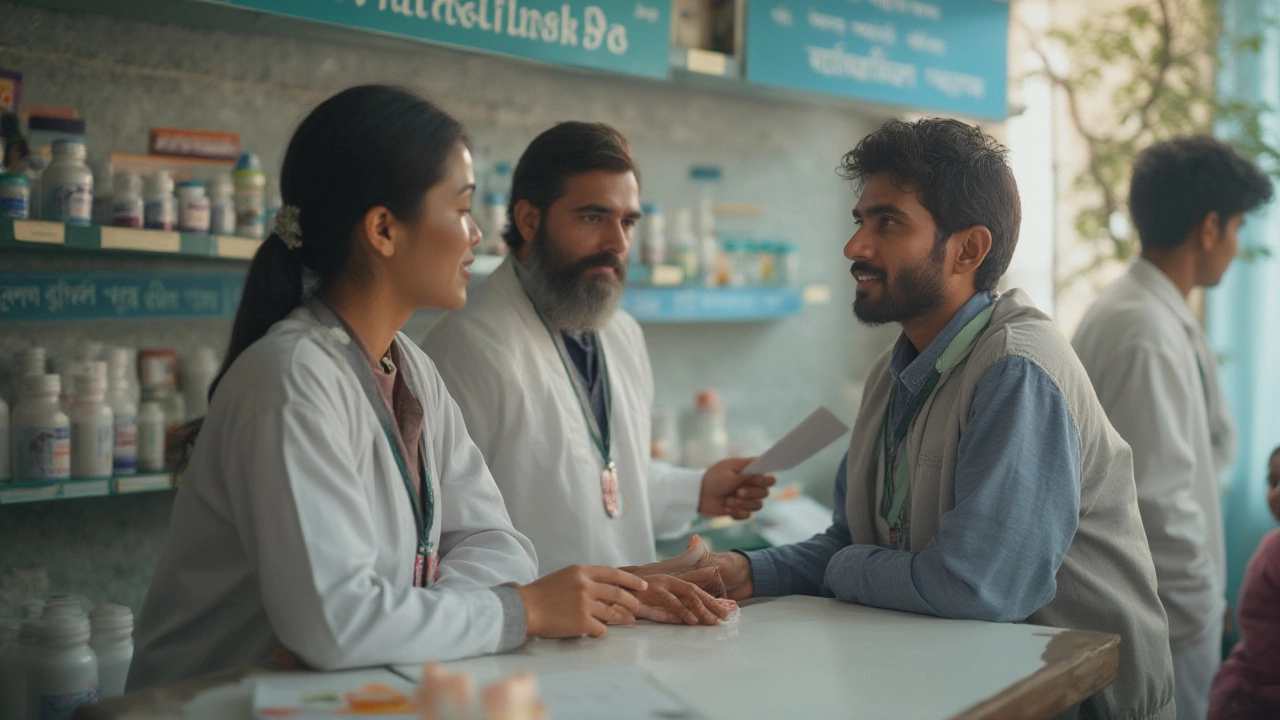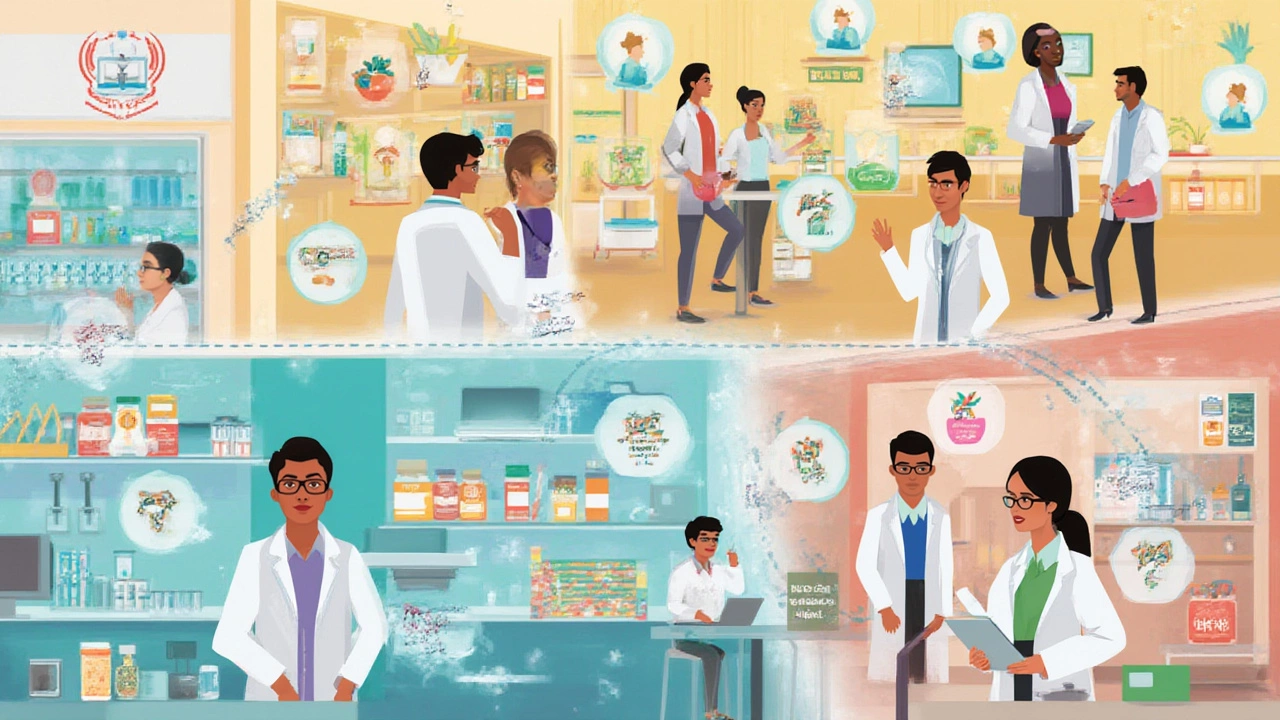
If someone told you that having a pharmacy degree in India is a golden ticket to a wealthy life, would you believe it? Let’s get real. The promise of a plush salary draws a lot of young people into pharmacy, but the truth is a little more complicated – sometimes surprising, sometimes hopeful. India's healthcare industry is exploding, but does that mean pharmacists are rolling in dough? Or are they stuck in modest-paying roles, dreaming of better days?
What Do Pharmacists in India Really Earn?
You’ve probably seen those figures online – some job sites claim freshers can expect ₹2.5–4 lakh a year, while senior roles rake in ₹7 lakh or more. But, here’s the rub: the reality swings wildly, depending on where you work and what you do. Got a pharmacy degree and just joined a retail chemist in a small town? Chances are, your starting monthly salary will hover around ₹12,000–₹20,000. Move your base to a big city like Hyderabad or Mumbai – sure, the numbers tick up, but so do your bills. In many top private hospitals and chains, pharmacists snag ₹25,000–₹36,000 a month if they're lucky – but only after a few years of slogging.
The government sector is a bit of an outlier. Land a job in a government hospital or with the public sector drug regulatory bodies? Expect about ₹40,000–₹60,000 a month, though competition is brutal and job openings are rare. There’s the added bonus of job security – one of the biggest draws for government gigs, right behind the paycheck.
Pharma companies – think R&D labs, manufacturing giants, and global MNCs – pay even better. Entry-level roles often pay ₹25,000–₹40,000 a month, but roles in clinical trials or production management sometimes go north of ₹60,000 with some experience. Still, these jobs need specific skill sets, usually a master's degree or at least solid internships. That means extra years in college, but hey, sometimes it really does pay off.
Factors Affecting Pharmacy Salaries
If you thought all pharmacists earn equally, time for a wakeup call. The gap between a small-town chemist and a pharma executive with a few certifications is massive, and here’s why.
- Education: A diploma (D.Pharm) may open doors, but a Bachelor’s (B.Pharm) or, better yet, a Master’s (M.Pharm, Pharm.D) stacks the deck in your favor. The higher the degree, the better your odds of a juicy salary.
- Experience: This one’s universal, but in pharmacy, just one year on your resume can mean a 15-25% hike at the next job switch. Five years in? Salaries sometimes double if you’ve got the right skills.
- Location: Urban centers always pay more – but they also cost more. Bengaluru, Mumbai, Hyderabad, Delhi, and Pune are the top-paying cities for pharmacists. Rural areas lag way behind on salary, but sometimes, you climb the ladder faster due to less competition.
- Job Type: Research, pharma sales, regulatory affairs, and manufacturing roles all pay more than retail chemist jobs. Many folks start in retail, but move fast if you want serious growth.
- Certifications: If you have a certification in clinical research, pharmacovigilance, or medical coding, you’ve just leapfrogged the average pharmacist. Employers, especially MNCs, pay extra for specialized skills.
The upshot? Play your cards right with the right degree, a few smart relocations, and some sharp certifications, and pharmacy can turn quite lucrative – but it’s basically a survivor’s game if you stick to small pharmacies in slow-growth regions.

Pharmacy Career Paths: Beyond the Counter
When most people picture a pharmacist, they see someone handing over medicines at the counter, but that’s just chapter one. The pharmacy career jungle is huge, and the most lucrative paths are rarely the ones you’d expect. Got a taste for lab work? Research & Development in pharmaceuticals is booming, especially with India’s rise as a generic manufacturing powerhouse. There’s huge demand for clinical research associates, drug safety officers, and pharmacovigilance managers. These roles tend to pay more and grow faster than retail pharmacy, but yes – they often need postgrad degrees.
For the bold, pharma sales and marketing can be a goldmine. Yeah, you’ll need people skills, a thick skin, and a taste for targets, but successful medical representatives can double or triple their income with commissions and bonuses. Corporate roles like regulatory affairs and quality assurance also offer strong salaries for those with a knack for paperwork, policy, and details.
Let’s not forget hospital pharmacy, which is getting more respect and responsibility these days. Big private hospitals hire clinical pharmacists with advanced degrees and pay them a decent chunk, sometimes matching or beating pharma companies. And with the digital health boom, telepharmacy and remote consultation for online pharmacies (think 1mg, Netmeds, Apollo 24x7) is exploding. These new-age gigs pay more than old-school counters and offer far better work-life balance.
Thinking of starting your own thing? Opening a pharmacy shop is classic – it can pay off, but expect tough competition and heavy licensing costs. The real moneymakers? Specialized pharmacies, like oncology drug suppliers, or tie-ups with top hospitals. These require deep pockets, but offer much higher incomes once the business picks up.
Upskilling: The Secret Sauce for Bigger Paychecks
What really sets high-earning pharmacists apart isn’t just luck – it’s smart upskilling. My friend Ajay, after three years in retail, took a short course in pharmacovigilance. That one move got him into an MNC with double his old pay. Opportunities are everywhere: short certifications in clinical research, medical writing, pharmacovigilance, medical coding, or regulatory affairs give a massive advantage. You don’t always need a full master’s degree to get ahead – even six-week online courses from trusted providers can open doors and start conversations with recruiters.
If you’re up for it, improving your soft skills works wonders too. Communication, negotiation, even basic sales talk – these matter more than you’d think in interviews. Another sharp tactic? Getting comfortable with tech. Being able to handle pharmacy management software, or understanding telemedicine platforms, gives you an edge, as online pharmacies are always hunting for tech-savvy staff.
For folks dreaming of moving abroad, clearing pharmacy licensing tests for the US, UK, or Australia is a long, tough slog – but the payout trounces Indian salaries by a mile. Many Indians work as pharmacy assistants or technicians overseas to start, then clear their licensing and climb up. Not for everyone, but worth it for the big dreamers.

How Does India Stack Up Globally?
Let’s face it, pharmacist salaries in India are still behind countries like the US, UK, Canada, and Australia. In those places, pharmacists can earn six-digit figures (in dollars or pounds), and often enjoy a more comfortable standard of living. Why the gap? Part of it is oversupply: each year, thousands of new pharmacy grads join the race, but jobs (especially high-paying ones) don’t keep up. The other piece is hospital and retail chain budgets, which are tighter here compared to developed countries.
But things are shifting. With India’s pharma sector expected to hit $130 billion by 2030, digital health growing, and a push for stricter drug regulation, more specialized, better-paid pharmacy roles pop up every year. Cities with major pharma hubs (like Hyderabad, Bengaluru, Ahmedabad) are seeing real wage growth, especially in research and regulatory fields. Plus, global pharma companies continue to invest in Indian talent, making international job postings or remote gigs less of a pipe dream.
Reality check: for now, pharmacists in India won’t all become millionaires, but with the right moves, some end up earning better than engineers or MBAs in other domains. It’s a marathon, not a sprint. The secret? Keep learning, stay flexible, grab every upskilling chance, and watch out for lucky breaks in fast-growing segments of healthcare.